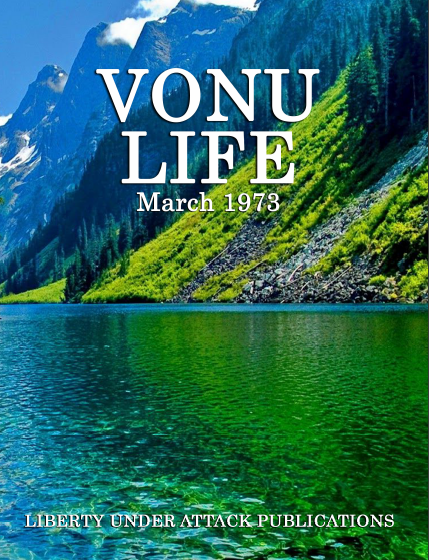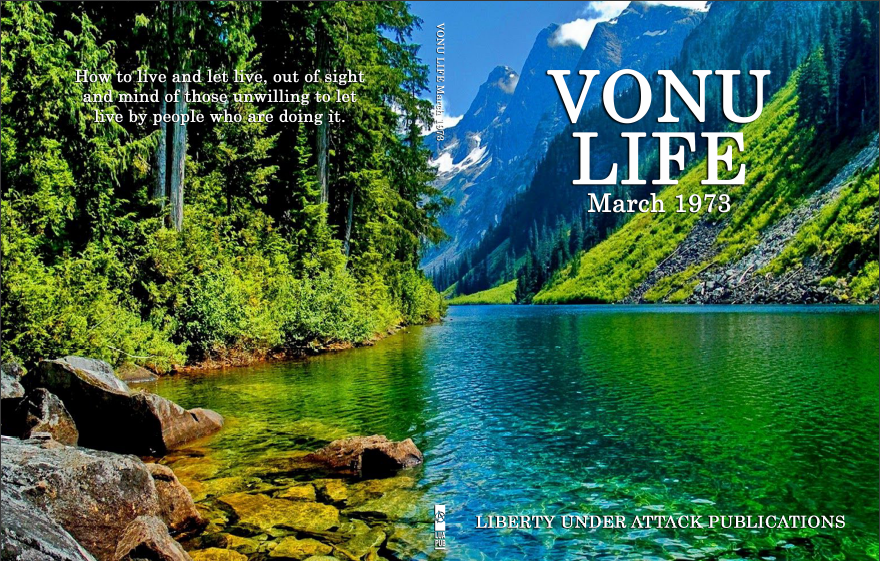Podcast: Play in new window | Download
Subscribe: Apple Podcasts | Android | Email | Google Podcasts | Stitcher | TuneIn | Spotify | RSS
On this intermission episode, I cover an article by Rayo from VonuLife, March 1973, a special 75,000+ word publication. This one is titled Ecology > Vonu > Technology > Peace.
Click here to download the publication for free, or purchase the paperback via the image below. Enjoy!
LIBERTYUNDERATTACK.COM/VONULIFE
[how to live and let live, out of sight and mind of those unwilling to let live…by people who are doing it]
ECOLOGY → VONU → TECHNOLOGY → PEACE
ECOLOGY → VONU: To be relatively safe from coercion I must live in harmony with nature. I must disturb the environment less than does a deer or bear or porcupine – else I will draw the attention of two-legged beasts.
Our shelters are small and low. They blend in with the trees, bushes and rocks. I cut few trees and those I cut are dead, or crowded and dying. I use fire sparingly – only for cooking and crafts, not heating. I kill only to eat or in self defense, and usually eat what I kill. Around camp I often wear moccasins and mukluks, or walk on rocks to minimize erosion and tracks. Any gardening is in small patches and grow-holes, scattered in natural openings.
TECHNOLOGY → VONU: In some ways vonuans – wilderness vonuans at least – are like the people who lived on this continent 400 years ago. But I am not hostile to technology. On the contrary, advanced technology makes vonu attractive. Limited to the materials and methods of 400 years ago, most of my energies would be spent securing food and protecting myself from the elements. I would have neither time nor tools to protect myself from organized predators. I would be less successful than were American Indians, who had generations of experience and faced more crudely equipped aggressors. This doesn’t mean I shun “primitive” methods either. I happily blend techniques of all ages to live most freely and effectively. Usually I use native materials for basic structures and large furnishings; manufactured items for light and mobile accessories.
TECHNOLOGY → ECOLOGY: Technology of the early industrial era was cumbersome. Manufacturing was most efficiently performed by throngs of people and big machines crowded together in huge factories. Products were big, consuming large amounts of raw materials. Big railroads and trucks were needed to haul ores to smelters and products to consumers. Mountains of wastes and lakes of pollutants were generated. Early-industrial technology was not very compatible with vonu nor with a clean environment.
But bigness usually indicates crudeness. Trends are now the other way. The newer, more sophisticated products are smaller. Compare a transistor radio with an old vacuum-tube set; a cassette recorder with a player piano; a box of microfiche cards with a library of books; freeze-dried foods with canned foods; a desktop computer with an office full of clerks. As products grow smaller and more efficient, less raw materials, space, power and transport are needed. And less waste is generated.
Better communication replaces physical concentration. Factories, offices and stores are beginning to decentralize with electronic links replacing the routine face-to-face contacts.
VONU → PEACE: Advanced technology makes vonu attractive; contemporary weaponry and coercive institutions make vonu imperative. In earlier times government provided order if not freedom and defense if not peace. But now, when nuclear and bacteriological weapons can be rocketed or smuggled to any city on earth, governments are as obsolete as moats and parapets. The contemporary State is not only incapable of protecting “its citizens” from outside aggressors; it has become the biggest aggressor with its endless taxes, conscriptions and interferences. The State provides “justice” by mass terror, “freedom” by mass servitude, and “defense” by mass murder.
Just as the State is obsolete as a means of defense against foreign governments and private criminals, so politics are obsolete as a means of defense against the State. Political “reform,” “revolutions” or “education” at most changes rulers and slogans; it does not bring about enduring freedom. In a community of a few hundred, democratic procedures can be helpful; in a nation of millions they are only placebos.
Defense, like industry, commerce and agriculture, must be decentralized. Individuals and small groups must provide their own. It is too early to say which forms of vonu will prove most effective – how many will live in wilderness, or underground, or on the move, or in ways I can’t even imagine. But I think the emphasis will be on concealment/deception/mobility, not intimidation. I believe I can be relatively safe and free only by being invisible or inconspicuous, not by pointing missiles at everyone else on earth.
VONU → ECOLOGY: Pollution and exhaustion of resources is caused not by too many people, so much as by too many people all forced to live the same way. The earth supports a vast quantity of life so long as that life is diverse – live in different habitats, eat different foods, defends itself in different ways. Organisms tend to diversify because there are advantages to diversity – that is why there are so many different forms of life on earth. Similarly humans diversify when able to exercise their preferences – consider the variety of peoples in North America 500 years ago – all descended from just a few bands of immigrants.
The relative sameness of humans today is due in large part to coercive institutions of the recent past. Just as a one-crop farmer depends on uniformity of plans, so an authoritarian system depends on uniformity of people. A State can control only to the extent that people act and react in similar ways. It is no accident that the strongest motive for compulsory tax-supported school in the U.S. a century ago when they were imposed, was not better education (literacy was already substantial and fast rising) but destruction of minority cultures through forced association and indoctrination of children.
So big, coercive government, like one-crop farming, is inherently bad ecology. Free “non-conforming” people, like diverse natural vegetation, are part of the earth.



One Reply to “TVP Intermission #55: ECOLOGY → VONU → TECHNOLOGY → PEACE”